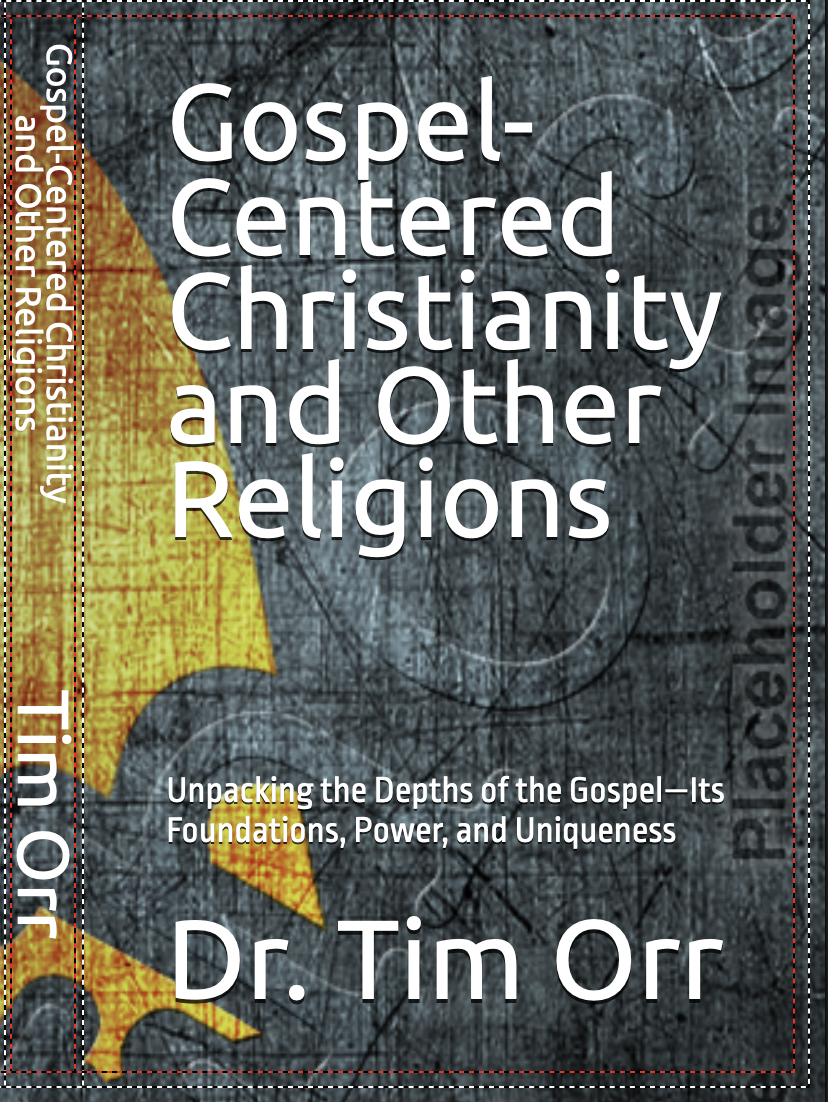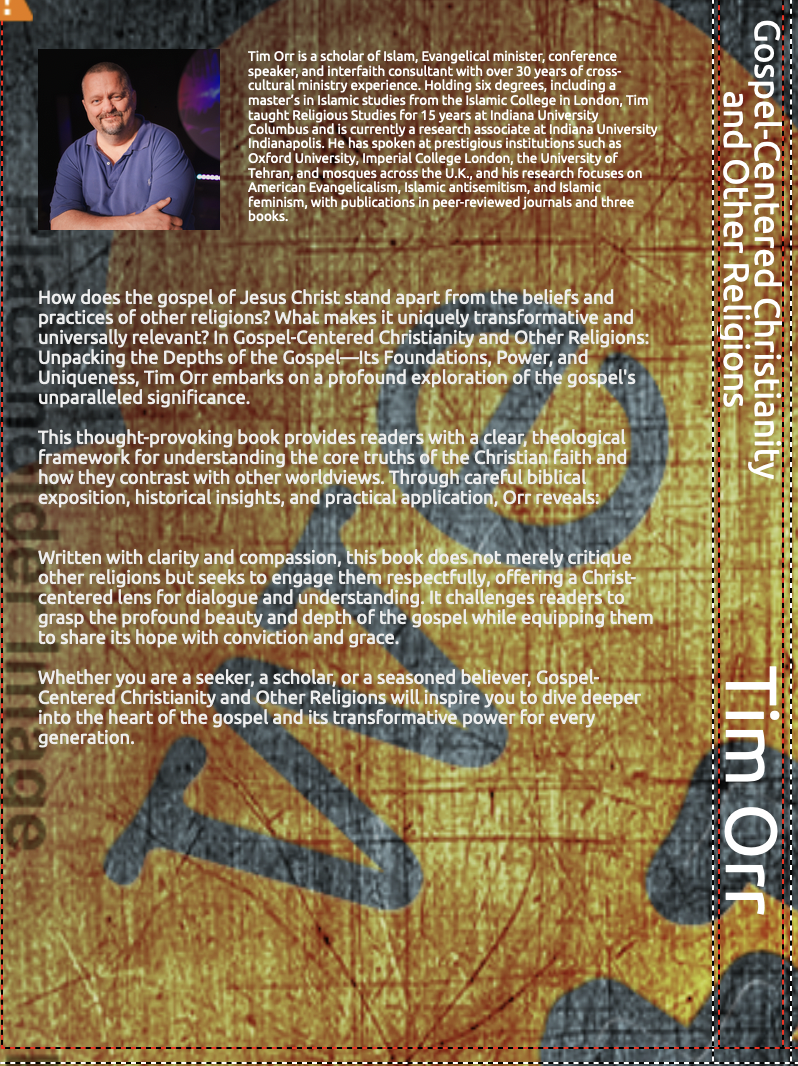

Exporing Faith, Culture, and Connection Bridging Worlds through Grace, Truth and Dialogue
By Dr. Tim Orr
Have you ever wondered how the gospel of Jesus Christ addresses the vast diversity of beliefs and worldviews across the globe? From ancient traditions to modern ideologies, humanity’s search for meaning, purpose, and hope takes many forms. Yet, the gospel offers something unparalleled: a relationship with the living God built on grace, not human effort.
In my upcoming book, Gospel-Centered Christianity and Other Religions: Unpacking the Depths of the Gospel—Its Foundations, Power, and Uniqueness, set to release toward the end of next month, I aim to equip readers with the tools they need to understand the gospel’s unique message and how it interacts with other religious worldviews. Each chapter is crafted to help you explore these beliefs, understand their distinctions, and see how the gospel stands apart—not just as one choice among many but as the ultimate answer to humanity’s deepest questions.
Here’s a preview of what’s inside:

Progressive Christianity: Returning to the Gospel’s Core
Progressive Christianity often emphasizes inclusivity and social justice, but sometimes at the expense of the gospel’s foundational truths. While these values can reflect important biblical principles, they often redefine key doctrines, such as sin, salvation, and the authority of Scripture, to align with contemporary cultural norms. This chapter critiques these theological shifts, highlighting how they dilute the gospel's transformative power and stray from the biblical call to personal repentance and faith in Christ. Exposing these deviations equips readers to discern truth from error and invites a return to the gospel’s unchanging message of grace, redemption, and the lordship of Jesus Christ.
Judaism: Discovering the Gospel’s Fulfillment
Judaism provides the backdrop of God’s covenant faithfulness and promise. Readers will explore how the gospel fulfills the longings of the Old Testament and extends the invitation to salvation to Jews and Gentiles alike. While Judaism rightly emphasizes the holiness of God and His covenant with Israel, it misses the fulfillment of these promises in Jesus as the Messiah. This journey highlights the unbreakable link between the Hebrew Scriptures and the New Testament. It examines where Judaism diverges by rejecting Christ as the fulfillment of the Law and Prophets, offering a deeper understanding of the gospel’s transformative truth.
Islam: Assurance in Grace, Not Works and A Polemical Challenge to Christianity
Islam emphasizes submission to Allah through moral and ritual obedience but lacks the assurance of salvation. Originating 600 years after the birth of Christianity, Islam presents a theological challenge as it seeks to undermine the Gospel and the essential teachings of Christianity, including the deity of Christ and the Trinity. The Quran’s polemical tone toward Christianity reflects this tension, as it reinterprets key biblical narratives to align with Islamic doctrine. This chapter critiques these distortions and equips readers to engage thoughtfully and respectfully with Muslims by contrasting the Quran’s message of works-based righteousness with the gospel’s message of grace, forgiveness, and the certainty of eternal life through Christ.
Hinduism: Hope in the One True Path
Hinduism, with its vast array of deities, philosophies, and practices, emphasizes the pursuit of enlightenment and liberation (moksha) through self-effort, meditation, and devotion. While it offers a framework for understanding spirituality and the divine, Hinduism lacks the assurance of salvation and the personal relationship with God offered through Jesus Christ. This chapter explores how the gospel speaks to the deepest longing of the human heart for truth, peace, and purpose, presenting Christ as fulfilling these desires. Addressing common Hindu beliefs, such as karma and reincarnation, demonstrates how the gospel provides freedom from the endless cycle of striving and offers the hope of eternal life through faith in the one true God. Readers will be equipped to share the transformative message of Christ, showing how He meets both the spiritual and existential needs that Hinduism seeks to address but cannot ultimately fulfill.
Buddhism: The Gospel’s Answer to Suffering
Buddhism seeks to address the problem of suffering (dukkha) through the Four Noble Truths and the Eightfold Path, emphasizing detachment, mindfulness, and the pursuit of enlightenment (nirvana). While it offers insights into the nature of suffering and human desires, Buddhism ultimately leaves individuals striving for liberation without the assurance of grace or a personal connection to a loving God. This chapter contrasts Buddhism’s path of self-reliance with the gospel’s answer to suffering through Jesus Christ, who entered into human suffering to offer redemption and eternal hope. Addressing key Buddhist concepts such as impermanence (anicca) and the illusion of self (anatta) reveals how the gospel provides a personal and transformative solution to life's deepest questions. Readers will be equipped to engage Buddhists with compassion and clarity, sharing how Christ offers freedom from suffering and the joy of a relationship with the Creator, who provides ultimate meaning and peace.
Mormonism: The Gospel of Grace vs. the Gospel of Works
Mormonism blends Christian language with a fundamentally different theology of works, exaltation, and additional revelation, diverging from historic biblical Christianity in significant ways. While it emphasizes personal effort and adherence to church ordinances for exaltation, the biblical gospel declares that salvation is a gift of grace through faith in Jesus Christ alone, not by works. This chapter unpacks the theological distinctions between Mormonism and Christianity, addressing doctrines such as the nature of God, the authority of additional scriptures like the Book of Mormon, and the path to eternal life. Readers will learn to lovingly and clearly understand the difference between the gospel of grace and Mormon teachings, equipping them to engage with Mormons to affirm shared values while pointing to the sufficiency of Christ’s atonement for salvation. By emphasizing the freedom and assurance in the biblical gospel, this chapter offers hope and truth to those caught in a works-based system.
Atheism: Proclaiming Truth in a World Without God
Atheism denies the existence of God, often leaving morality and meaning as human constructs subject to individual or societal interpretation. While it may claim to rely on reason and evidence, atheism struggles to provide ultimate answers to life’s biggest questions, such as the origin of the universe, the basis of objective morality, and the purpose of existence. This chapter equips readers to demonstrate how the gospel offers intellectually robust answers to atheism and satisfies the deepest longing of the human heart for love, purpose, and hope. Addressing common objections to Christianity, such as the problem of evil and the reliability of Scripture, shows how belief in God provides a foundation for rational thought, moral truth, and ultimate meaning. Readers will be encouraged to engage atheists with grace and humility, offering the hope of the gospel as the fulfillment of humanity’s search for truth and significance.

What to Expect from the Book
This book isn’t about tearing down other beliefs—it’s about equipping you to:
- Understand other worldviews with clarity and respect.
- See the unparalleled beauty and power of the gospel.
- Engage in meaningful conversations with conviction and grace.
Whether you’re a believer, a seeker, or a scholar, Gospel-Centered Christianity and Other Religions is designed to inspire you to dive deeper into the heart of the gospel and its transformative relevance for every culture, generation, and worldview.
As we approach the release at the end of next month, I’m excited to share more updates and insights. Let’s journey into the depths of the gospel and share its good news with a world searching for hope.
Tim Orr is a scholar of Islam, Evangelical minister, conference speaker, and interfaith consultant with over 30 years of experience in cross-cultural ministry. He holds six degrees, including a master’s in Islamic studies from the Islamic College in London. Tim taught Religious Studies for 15 years at Indiana University Columbus and is now a Congregations and Polarization Project research associate at the Center for the Study of Religion and American Culture at Indiana University Indianapolis. He has spoken at universities, including Oxford University, Imperial College London, the University of Tehran, Islamic College London, and mosques throughout the U.K. His research focuses on American Evangelicalism, Islamic antisemitism, and Islamic feminism, and he has published widely, including articles in Islamic peer-reviewed journals and three books.
Sign up for Dr. Tim Orr's Blog
Dr. Tim Orr isn't just your average academic—he's a passionate advocate for interreligious dialogue, a seasoned academic, and an ordained Evangelical minister with a unique vision.
No spam. Unsubscribe anytime.
